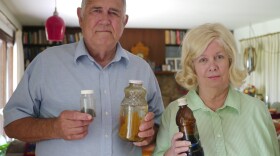Alex Mills is a company man. He heads the largest state oil and gas association in the United States. He’s based in Wichita Falls, 90 minutes northwest of the Azle-Reno area, where a series of earthquakes hit six months ago. This story is part of our series on “What’s Behind the North Texas Quakes?”
As president of the Texas Alliance of Energy Producers, Alex Mills represents businesses in nearly 30 states. In a weekly column, he wrote that hydraulic fracturing has become a focal point of attack for many environmental groups that want to deter or ban oil and natural gas production.
“The issue with hydraulic fracturing is not really an issue,” Mills said. “Because hydraulic fracturing is a process that has proven to be safe and reliable to get hydro-carbons out of the ground, oil and natural gas.”
He says officials from a number of federal agencies, including the Environmental Protection Agency, agree that fracturing is safe.
“What has come under the microscope in the Azle-Reno area, north of Fort Worth, is I think people have lumped, mischaracterized, hydraulic fracturing," Mills said. "Lumped that in with all the other activity that’s going on in the area.”
It’s important to know the distinction between hydraulic fracturing, he says, and injection or disposal wells.
“Hydraulic fracturing is the process of going in and making a fracture miles below the earth,” he said.
Injection wells store the waste water from oil and gas drilling. Environmentalists say the water is toxic, and that there isn’t enough oversight. This water is piped underground, in some cases several miles deep.
“You can’t have one without the other,” Mills said. “You have to be able to dispose of the water or you can’t produce. If you can’t produce, all the economic benefits that go into the area will be shut down.”
Mills says the industry has been the spark plug for the Texas economy in the last decade, producing both jobs and tax revenues. The industry recognizes that there’s conflict between the public and companies exploring for oil and gas.
“The geology is such that you’ve got to drill where the oil and gas is,” Mills said. “And there’s just no two ways about that.”
When a series of earthquakes rattled the Reno and Azle region, some locals blamed the nearby oil and gas activity.
“The industry understands that we’ve got to find the problem and then address the solution,” Mills said. “If it is oil and gas activity, the industry definitely wants to fix it.”
SMU scientists are currently looking into what’s causing the earthquakes, but that study may not be ready for another year.
This is the fourth story in a series called "What's Behind the North Texas Quakes?"
Earthquake public forum to be held June 18 in Azle
What’s behind the earthquakes in North Texas?KERA and StateImpact Texas will host a free public event to explore the issues at 7 p.m. June 18 at the Azle High School Auditorium. Learn more about the forum here.






